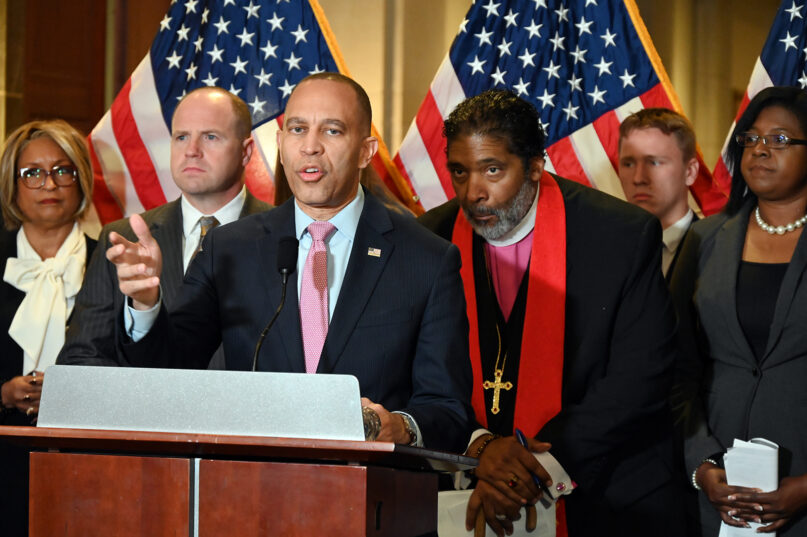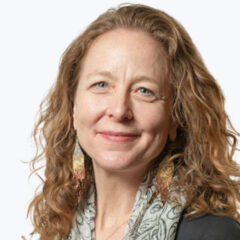(RNS) — When I began working with a faith-based lobbying organization 30 years ago, I could never have imagined how much change I would witness in Congress during my career, nor how deeply my own faith in our democratic system would be challenged.
I first learned to lobby on federal policy in the ’90s with the Friends Committee on National Legislation, a Quaker organization established in 1943 as a voice for peace on Capitol Hill. Lawmakers regularly worked across the aisle on bipartisan initiatives, and independently from the executive branch. It wasn’t easy to pass bipartisan legislation for a more just, peaceful and healthy planet, but it was possible.
I saw partisanship and political division grow over the years, from a government shutdown under President Bill Clinton, to the rise of the Tea Party, to the War on Terror under Presidents George W. Bush and Barack Obama, to continued gerrymandering of congressional districts. As Congress grew weaker, the executive branch became stronger.
Through it all, FCNL stood firmly in our nonpartisan witness for the common good. We focused on lifting up shared values, encouraging principled compromise and reminding Congress that government works best when rooted in conscience and cooperation.
Now, the divisions in Washington and our country are more entrenched than many of us have ever witnessed. I could never have imagined seeing masked Immigration and Customs Enforcement agents kidnap neighbors off our streets, rip families apart and even zip-tie children. Nor could I have envisioned that the president would order unauthorized military action against Venezuela and tell our own soldiers to prepare for a “war within.”
I find myself asking: Will Congress remember its purpose — to represent the people in all our diversity and complexity, serve as an independent branch of government and uphold the rule of law?
We can’t be sure, as this Republican-controlled Congress has ceded much of its constitutional authority — particularly its power over war and spending — to the executive branch. And President Donald Trump seems intent on acting with no limits, with little regard for the law or Constitution. He did, after all, declare unabashedly on Aug. 26, “I have the power to do anything I want to do.” We should all be alarmed.
Sure, lockstep action between the White House and the party controlling Congress is often expected. But members of Congress are still elected to represent their constituents, uphold their constitutional authorities and act with conscience for the good of the country.
Experts in authoritarianism and people who have lived under oppressive regimes see familiar warning signs: consolidation of power in the executive, punishment of political opponents, use of the military against civilians and erosion of democratic norms. This may have sounded like a hyperbolic comparison 30 years ago. Today, these are not abstract fears, but real dangers to our communities, to truth and to peace.
As someone trained in peacebuilding and conflict resolution, I lose sleep worrying about the future of our country and communities. I see the potential for not just entrenched polarization for years to come, but the real possibility of escalating political violence, growing state violence against civilians and even armed conflict within our country.
I believe we can still find a way to de-escalate this crisis, rebuild social cohesion and reassert the rule of law. But we need Congress to step up and regain the courage of conscience.
Quakers believe that every individual can access the Divine and that there is that of God in every human being. This is foundational to our understanding of the sacred nature of individual conscience. When we face moral dilemmas or struggle to know what to do in the face of great challenge, we listen for that still, small voice inside us to guide our actions. That Divine Guidance is there to help us find a path of integrity and truth amid uncertainty, fear and suffering.

Like so many in this country, I hunger for those in power to speak up and show up with a renewed consciousness. I wonder whether that still, small voice is getting stifled by the noise and lies.
Thankfully, not everyone in power is abdicating their responsibilities. More members of Congress are speaking out against the Trump administration’s corruption and authoritarianism. Last month, a dozen Democrats, including House Minority Leader Hakeem Jeffries of New York and Democratic Whip Katherine Clark of Massachusetts, joined faith leaders in a powerful vigil on Capitol Hill to protect health care and democracy.
Several Republicans have also taken important stands recently. Sens. Rand Paul of Kentucky and Lisa Murkowski of Alaska voted to reassert congressional war powers in the face of unauthorized strikes against civilian boats in the Caribbean. Sen. Bill Cassidy of Louisiana backed a National Defense Authorization Act amendment requiring state consent before deploying nonfederalized National Guard troops, and Sen. Thom Tillis of North Carolina has voiced concerns about federal overreach in troop deployments.
I am also encouraged by the words of Sen. James Lankford, R-Okla., who recently said on CNN’s “State of the Union”: “I have Democratic friends that think very differently, vote very differently, but they’re still my friend on it. So, just … believing differently than some other American is not illegal, that’s America.” I hope Congress will hold President Trump to that standard.
These actions show what moral courage looks like when conscience outweighs partisanship. But far more is needed — both from Republicans uneasy with the administration’s direction and Democrats whose responses remain muted.
In the coming weeks, critical votes on appropriations and war powers — two of the most fundamental powers given to Congress by the Constitution — will provide new opportunities for lawmakers from both parties to act with integrity and follow their faith. These are not procedural battles — they are moral ones. Over 90% of Congress identifies as Christian, a faith tradition that teaches us to love our neighbors, care for the poor, help those in need, welcome the stranger and pursue peace. I pray all members of Congress, whatever their spiritual tradition or secular values, will listen to their own conscience and, as Quakers say, let their lives speak.
As a young lobbyist, I never dreamed I would have to lobby against a president’s efforts to create a militarized autocracy pursuing what can only be described as a white supremacist agenda. I never thought we would have to lobby and protest as fervently as we are just to protect the basic values and principles of the America we believe in. But I also never imagined we would see the kind of outpouring of civic action, mutual protection, advocacy and resistance we are witnessing in response. This is the courage of conscience.
Though the future for our country may be uncertain, the resilience of our communities sustains my faith that the people of this country are standing up for the world we seek. It’s time for Congress to do the same.

(Bridget Moix is the general secretary of the Friends Committee on National Legislation and leads two other Quaker organizations, Friends Place on Capitol Hill and the FCNL Education Fund. The views expressed in this commentary do not necessarily reflect those of Religion News Service.)
Original Source:
https://religionnews.com/2025/11/04/where-is-the-courage-of-conscience-in-congress/